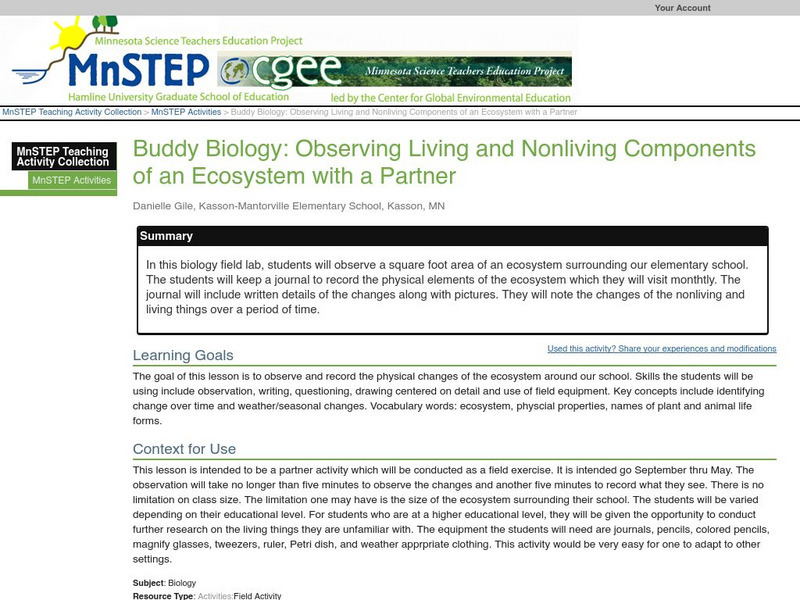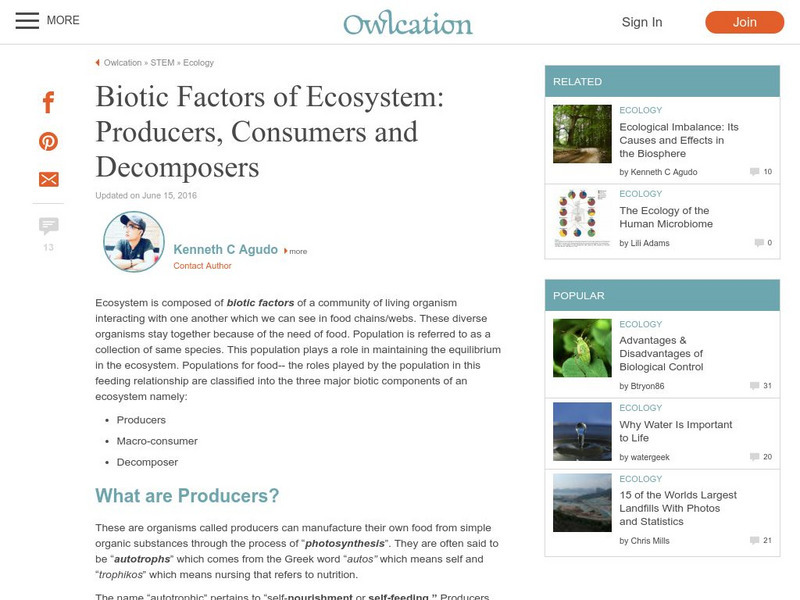Hi, what do you want to do?
Curated OER
Got Plants
Second graders discover that all living things need food in order to live. In groups, they examine the interconnectedness between animals and plants. They identify which animals eat plants to survive and which animals eat animals that...
Curated OER
Biotic Factors
Students identify individual organism, a species, and a population within the study community. They identify biotic factors at the site and attempt to characterize the site's species diversity.
Curated OER
The Wildlife Web I
Students explore the relationship between producers and consumers. In this activity, they trace the ingredients in the foods they eat to plants. Supplement to Natureworks episode from New Hampshire Public Television, but activities may...
Curated OER
Making Marsh Connections
Third graders explore the interdependence among the plants and animals in natural communities.
Curated OER
Soda Bottle Compost: Nutrient Cycling in Action
Students investigate, through their own experimentation, the important role wildlife play in nutrient cycling. Earthworms and compost are used in this experiment and different experimental setups be evaluated.
Curated OER
THE FARMER CARES FOR THE LAND
Students will identify cause and effect relationships in issues relating to Agriculture and the environment.Ask students to describe what farmers do. Then ask students to define the word "environmentalist." Ask students if they have...
Curated OER
Down By the River
Students examine how watersheds work and determine the difference between point and nonpoint source pollution. They research management practices to reduce pollution and investigate how everyone can participate in reducing water pollution.
Curated OER
Fair Games
Students participate in several chance activities and examine a few games for fairness. They become game designers who are asked to design a fair game for a toy company. Students must describe the rules for play and examine...
Science Education Resource Center at Carleton College
Serc: Observing Living and Non Living Components of an Ecosystem With a Partner
In this activity learners will observe a square foot of an ecosystem surrounding our elementary school. They will keep a journal to record the physical elements of their area. It will include both written details and drawings. They will...
Science Education Resource Center at Carleton College
Serc: Observing Living and Nonliving Components of an Ecosystem With a Partner
In this biology field lab, students will observe a square foot area of an ecosystem surrounding our elementary school. The students will keep a journal to record the physical elements of the ecosystem which they will visit monthtly. The...
University of Michigan
University of Michigan: The Concept of the Ecosystem
Lesson looks at the definition of an ecosystem, biogeochemical cycles, and factors responsible for the differences between ecosystems.
Other
Hub Pages: Abiotic Factors: A Component of Ecosystem
In the environment, there are external factors that really affect organisms living within it. One of these factors is the set of abiotic factors, or nonliving variables, such as wind, ocean, day length, rainfall, temperature, and ocean...
Georgia Department of Education
Ga Virtual Learning: Ecosystems
This module offers an in depth study of the fundamental components of ecosystems. Activities include mini-lessons with videos and student assignments.
SMART Technologies
Smart: Living and Nonliving Things
Students define the characteristics of living and non-living things, identify living and non-living components of an ecosystem, and identify the roles of organisms in living systems.
Other
Hub Pages: Biotic Factors of Ecosystem: Producers, Consumers and Decomposers
An ecosystem is composed of biotic factors of a community of living organisms interacting with one another which we can see in food chains/webs. These diverse organisms stay together because of the need of food. Population is referred to...
Other
Grasslands Conservation Council of British Columbia
An overview of the ecosystems in British Columbia.
Alabama Learning Exchange
Alex: Making and Observing Life in a Terrarium
For this lesson, the students will learn what a terrarium is, the layers of a terrarium, and the function of these layers. They will see how these components work together to create an ecosystem. This lesson plan was created as a result...




















